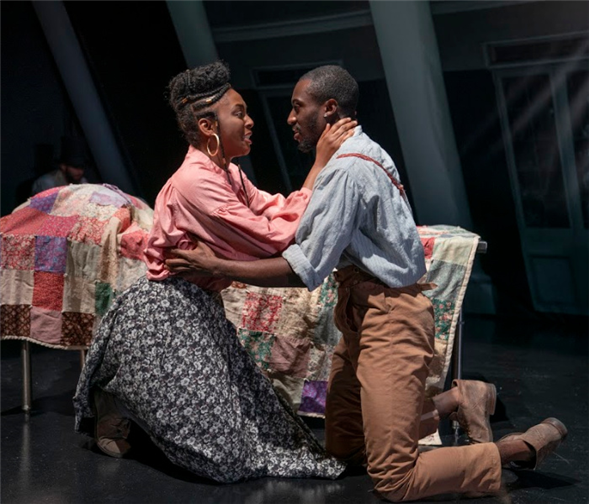Translate Page

The Flea's revival of Southern Promises makes the play even more controversial
---
When Southern Promises premiered in New York in 2008, Barack Obama was on the brink of becoming the country's first black President. That provided an optimistic backdrop for Thomas Bradshaw's incendiary play about slavery. Even though it featured raw scenes of rape and brutality, it had a somewhat happy ending, inspired by the real-life saga of Henry "Box" Brown, a Virginia slave who successfully shipped himself to abolitionists in the North in a wooden crate. "It was easy, in a way, for audiences to feel good about themselves after it finished," recalls Bradshaw, noting that it ended with the former slave rejoicing in his newfound freedom. The dramatist decided that if Southern Promises were ever revived, he wanted to leave theatregoers shaken, not soothed.
A decade later our nation is in a very different place, and Bradshaw has extensively reworked the script, especially that ending, which he says has been "rewritten for our time because it's about how we're dealing with the legacy of slavery." This new iteration of Southern Promises is currently running at The Flea, the final production in the theatre's Color Brave Season.
"I only curate plays that scare me," says Niegel Smith, The Flea's artistic director, who also helmed this production. "If I'm not scared by the idea of putting a work up, it doesn't get on the stage. If a play has a couch in it, it better explode or implode, or turn into a Transformer. Couches are the death of theatre." Smith had wanted to work with Bradshaw for a long time, and the revamped Southern Promises was the perfect opportunity to join forces. "We inherited a culture that's at the intersection of race and capitalism," says Smith, who, like Bradshaw, is black. "I think we're always going to need to retell ourselves this story to see why the world sees us through a certain perspective."
In addition to the play's overhauled script, another major change concerns the casting. The 2008 version had white actors as the slave owners and African American actors as the slaves; the 2019 cast is comprised entirely of people of color. Smith believes that seeing white actors play the oppressors is too easy. Casting actors of color as the tyrannizers forces theatregoers of color to reflect on a system they didn't create, but inherited and perpetuate. "I'm interested in complicating that, so we ask ourselves, what is our complicity?" says Smith. Bradshaw adds, "You transcend race so you can see the inhumanity and the transgressions, instead of just seeing white bodies inflicting harm on black bodies."
Since Bradshaw burst onto the theatre scene a little over a decade ago, his work has been incredibly divisive, earning him accolades and awards as well as derision and dismissals. His biggest controversy to date surrounded his 2017 play Thomas and Sally, which prompted protests because detractors claimed it romanticized the relationship between Thomas Jefferson and his slave, Sally Hemings.
Bradshaw knew from a young age that he wanted to become a playwright. He attended theatre with his grandmother as a child, and quickly realized that the people on stage were nothing like the ones he knew in real life. "I knew people who acted on impulse," he recalls. "At the theatre, I saw people thinking everything through. That's not reality." Bradshaw's work incorporates elements of melodrama, heightened emotions and blunt savagery because he wants to show people who they are, not better versions of themselves. If you google his name, you are guaranteed to find several accounts of offended folks people leaving the theatre mid-performance during his plays. "Dramatists have a duty to entertain, but we have to be entertaining while exploring the most urgent issues we face as a society today," Bradshaw says. "Theatre can't be a lecture. No one's going to pay attention to what you're doing if you're boring them." Smith agrees. "Every play needs four things: a kiss, a fight, a song and a dance. That's the stuff of life."
Both Bradshaw and Smith serve as mentors in an industry that's still predominantly white. Along with their senses of humor and social consciousness, they share similar views on what the future of theatre should look like. As an assistant professor at Northwestern University, Bradshaw encourages his students to explore new ways of writing. He asks them, "What aren't we seeing that you think we should be seeing? That is the thing you should be writing about. You should be thinking about filling voids in our society." Bradshaw's confrontational body of work is a testament to that philosophy.
---
Jose Solís is a NY-based writer and editor who's been covering theatre and film professionally since 2003. He is a member of the Drama Desk. Follow him at @josesolismayen. Follow TDF at @TDFNYC.
Top image: Yvonne Jessica Pruitt and Shakur Tolliver in Southern Promises. Photos by Joan Marcus.
TDF MEMBERS: Go here to browse our latest discounts for dance, theatre and concerts.